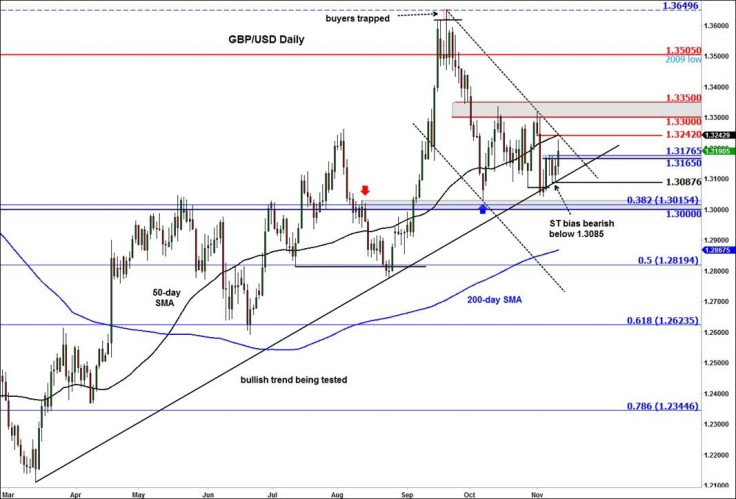Is the post-Brexit pound the 'Mr Bean' of currency markets?
Commentators are bemoaning the currency's unpredictability.

Another week, another kerfuffle as far as the pound sterling's trajectory goes. Political headwinds over Prime Minister Theresa May's political future and economic headwinds driven by fractious Brexit talks continue to hound the British currency.
Then there's the Bank of England, which has recently raised the benchmark UK interest rate by 25 basis points to 0.50% - the first rate hike in a decade, taking the country back to the level it was in August 2016, when the central bank panicked and cut the rate unnecessarily in the eyes of many.
Surely a central bank in rate hiking mood should be good for a currency? But wait, it seems the BoE is "dovish" and not "hawkish" at all, with inflation stabilising at 3% and the economy still facing serious headwinds.
Then there's the mainstream discourse. Doomsday predictions in the wake of the Brexit just didn't materialise, according to ardent Brexiters. Yet, the Remainers quip back and say "just wait – the worst is yet to come".
Signals from the European Union over how Brexit might unfold are equally confusing. The economic bloc's chief negotiator, Michel Barnier, and European Commission President Jean Claude Juncker issue alarmist warnings, only for EU heads of governments – the actual and only decision-makers on where the whole saga will end up – to sound a more conciliatory tone.
Underlying it all is the UK's 'divorce settlement'. Its size, given the country's departure, will leave the EU with a massive financial hole, as the Brits are only second to the Germans in terms of net contributions to the EU, and one of the very few who put in more in monetary terms than they take back.
Wobbly like Mr Bean
Given such a muddy context, woe betide the currency forecasters. Take Morgan Stanley and HSBC, who have been harping on since last year that the pound would hit parity with euro. It hasn't, and the likelihood is that neither European Central Bank nor the EU's chief power broker Germany would want that.
The British government probably wouldn't want that either, despite tall public claims by the political classes that a weaker pound would boost exports.
Perhaps Kit Juckes, head of forex at Societe Generale and IBTimes UK columnist, has asked the best question of them all in recent days – is pound sterling, in fact, the Mr Bean of the currency markets these days?

The clumsiness that's afoot in Westminster, forecasts about the pound and its recent trajectory in the current climate certainly draws some parallels with the hapless and clumsy comic character Mr Bean, portrayed to much critical acclaim by actor Rowan Atkinson.
"There's enough uncertainty about the UK's negotiations to leave the EU without any more being added and Asian markets reacted negatively to the headlines, but how much does this really matter?
"The pound is priced for soggy growth and difficult negotiations. Both are likely whoever runs the Conservative party should Theresa May be replaced," Juckes says.
"The weakness of the Prime Minister's position, like the incompetence of Mr Bean, is well known. That's before we wonder who would want her job in the current circumstances; and before we wonder what her departure might do to the odds of another election, which might well put Jeremy Corbyn into Downing Street.
"And would that be good for sterling [much softer Brexit] or bad [left-wing Labour hasn't been around since the pound's worst decade of all]?"
Juckes says his "best guess" is the pound might keep "bumping along the bottom".
"But we still like being long – i.e. bet on rising EUR/GBP at the lower end of the last few months' range. GBP/USD by contrast is slave to EUR/USD permutations."
Roller coaster ride
Others in the City also flag up the uncertainty. Take for instance Mihir Kapadia, founder of boutique investment house Sun Global Investments, who notes: "The pound is down by 10% against the euro since the EU referendum. It shows resilience but remains vulnerable to political fallout from the faltering Brexit negotiations. The inflation threat is very much potent as there is still some considerable uncertainty on how Brexit will pan out."

The uncertainty – for both London and Brussels – means the market should most certainly prepare for a roller coaster ride as far as the pound goes, according to Fawad Razaqzada, technical analyst at Forex.com.
"The GBP/USD faces a topsy-turvy week after its BoE-related drop last week. Will the data cause it to move outside of its six-week consolidation range? Last week, it managed to hold above the bullish trend line (see chart above), so the longer-term bullish trend has remained intact for the time being. However, the pound is still residing inside a short-term bearish channel."
So is pound down and out against major currency crosses? Not quite. Has it weathered the storm and is emerging stronger, not quite either. It's a bit like Mr Bean – wobbly, clumsy, confounding and prone to erratic highs. But whatever it is, it's anything but dull.






















